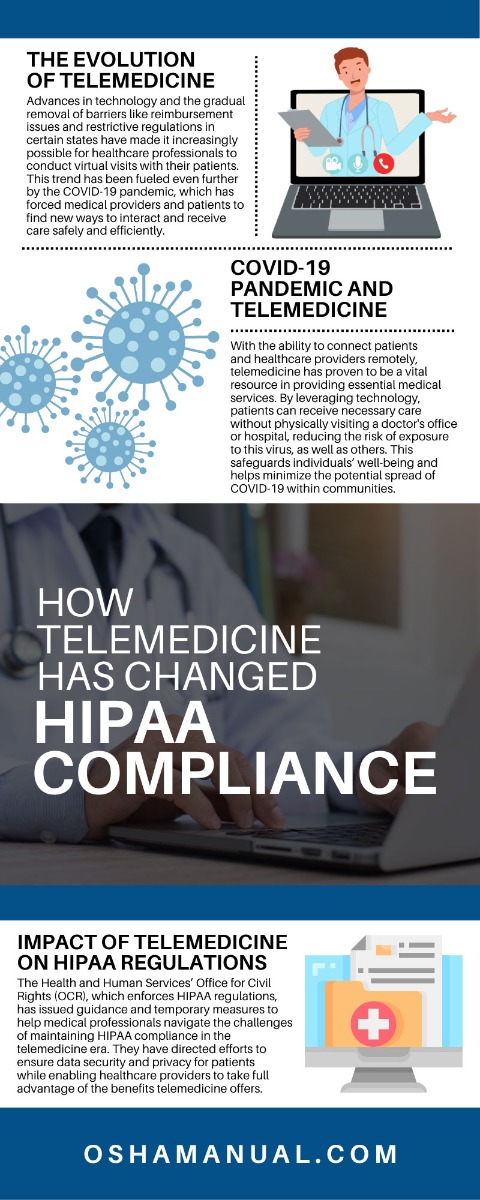
As medical practices and technology have evolved, so have the ways medical professionals care for their patients. A major development in this area has been the rise of telemedicine, which enables doctors to consult with and treat patients remotely using videoconferencing, messaging, and other digital tools. Telemedicine has naturally caused a significant shift in how healthcare providers approach various aspects of patient care and data protection, including their efforts to achieve and maintain compliance with the Health Insurance Portability and Accountability Act (HIPAA). This is why it's essential for medical offices and professionals to understand how telemedicine has changed HIPAA compliance. All medical practices and professionals should learn how they can continue to prioritize patient privacy as they embrace this rapidly developing field.
The Evolution of Telemedicine
In recent years, telemedicine has grown from a niche service into a widely accepted alternative or supplement to traditional, in-person methods of healthcare delivery. Advances in technology and the gradual removal of barriers like reimbursement issues and restrictive regulations in certain states have made it increasingly possible for healthcare professionals to conduct virtual visits with their patients. This trend has been fueled even further by the COVID-19 pandemic, which has forced medical providers and patients to find new ways to interact and receive care safely and efficiently.
COVID-19 Pandemic and Telemedicine
The unprecedented situation created by the COVID-19 pandemic has underscored the significant role that telemedicine can play in ensuring access to healthcare, even during challenging times. With the ability to connect patients and healthcare providers remotely, telemedicine has proven to be a vital resource in providing essential medical services. By leveraging technology, patients can receive necessary care without physically visiting a doctor's office or hospital, reducing the risk of exposure to this virus, as well as others. This safeguards individuals’ well-being and helps minimize the potential spread of COVID-19 within communities. Furthermore, telemedicine offers a lifeline for vulnerable populations, such as the elderly or immunocompromised individuals, who may be at higher risk for severe illness if exposed to the virus. By offering a safe and convenient alternative to in-person visits, telemedicine ensures healthcare remains accessible and available to all, regardless of the prevailing circumstances.
Impact of Telemedicine on HIPAA Regulations
As telemedicine has become more prevalent, it has had a profound impact on how healthcare professionals handle patient privacy and security, which are core components of HIPAA compliance. The shift from in-person consultations and treatments to virtual ones has expanded the scope of HIPAA regulations to encompass new forms of patient data, such as video recordings, chat transcripts, and other digital records generated during online consultations.
In response, the Health and Human Services’ Office for Civil Rights (OCR), which enforces HIPAA regulations, has issued guidance and temporary measures to help medical professionals navigate the challenges of maintaining HIPAA compliance in the telemedicine era. They have directed efforts to ensure data security and privacy for patients while enabling healthcare providers to take full advantage of the benefits telemedicine offers.
Specialty HIPAA Regulations Regarding Telemedicine
To better address the unique challenges practicing telemedicine poses, the OCR and other federal authorities have developed specialty HIPAA regulations specifically aimed at telemedicine activities. One such example concerns mental health and substance abuse treatment, where telemedicine can bridge the gap in access to care for patients in remote or underserved areas. In this context, HIPAA regulations have adapted to account for the specific sensitivities and risks associated with handling sensitive mental health data and maintaining patient confidentiality in a digital environment.
Challenges in Ensuring HIPAA Compliance in Telemedicine
Despite the growth of telemedicine and the accompanying adjustments made by regulatory authorities, healthcare providers continue to face challenges in ensuring HIPAA compliance while embracing digital healthcare solutions. For instance, the move to virtual care has led to greater reliance on video conferencing and electronic health records, which can present significant security risks when not managed properly.
Telemedicine platforms can be vulnerable to hacking and data breaches, potentially exposing sensitive patient information to unauthorized individuals. Additionally, healthcare providers must grapple with the question of how to securely store and transmit patient data created during telemedicine encounters. They must also address how to protect this information from unauthorized access while still allowing for necessary sharing between providers and other authorized parties.
Ways To Maintain HIPAA Compliance While Practicing Telemedicine
To effectively address these challenges and ensure compliance with HIPAA regulations, healthcare providers must remain vigilant in their approach to telemedicine. This involves implementing robust security measures, such as encryption and authentication protocols, vetting telemedicine platforms for their privacy and security features, and training staff to safely handle new forms of patient data.
At the same time, healthcare providers should review their existing HIPAA policies and procedures to ensure they are applicable to telemedicine activities. This may include updating consent forms, creating new protocols for handling patient data generated during virtual consultations, and conducting regular risk assessments to identify areas of potential vulnerability. Healthcare providers must prioritize patient privacy and continually adapt their practices to keep up with the ever-changing landscape of telemedicine.
Resources for HIPAA Training for Healthcare Practices
Numerous resources are available to assist healthcare providers in understanding and adapting to the changing rules around HIPAA compliance in telemedicine. The OCR's official website offers guidance and educational materials on topics such as telehealth, cybersecurity, and patient data privacy. Additionally, many professional organizations offer specialized training and certification programs for medical professionals looking to ensure their practices remain compliant with HIPAA regulations in the telemedicine era. If your business is ready to pursue training for new HIPAA regulations regarding telemedicine, you can find all the HIPAA training resources you need at Gamma Compliance Solutions. Our professionals offer HIPAA training in easily accessible courses for your whole team, making it easy and convenient to share this crucial information.
Telemedicine has brought about significant changes to the way healthcare is delivered, and as a result, it has also transformed how HIPAA compliance is achieved and maintained. While challenges come with leveraging technology for medical care, the benefits and potential of telemedicine are clear. With careful attention to security, privacy, and patient-centered practices, healthcare providers can continue to embrace this innovative approach while protecting patient data in accordance with HIPAA regulations. By continuing to adapt and evolve along with the digital age, medical professionals will not only ensure HIPAA compliance but also improve the overall quality and accessibility of healthcare for their patients. Consider how telemedicine has changed HIPAA compliance in your practice, and remember to adjust your policies and procedures accordingly to maintain a responsible business.

